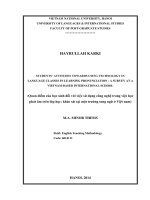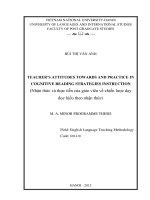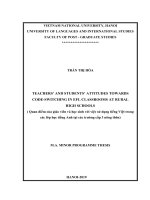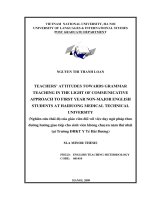Writing task 2 9.0 9999 attitudes towards old people in different countries
Bạn đang xem bản rút gọn của tài liệu. Xem và tải ngay bản đầy đủ của tài liệu tại đây (178.61 KB, 8 trang )
Overall band score
9
9+9+9+9
See below C&C LR GRA
Model answer
WRITING TASK 2
You should spend about 40 minutes on this task.
Write about the following topic:
In some societies, old people are respected and valued, while in others they are
seen as a burden and neglected.
Why is this the case?
What can be done to promote greater respect for the elderly?
Give reasons for your answer and include any relevant examples from your own
knowledge or experience.
Write at least 250 words.
Original answer In various societies across the globe, the treatment of the elderly varies
significantly. While some cultures revere and honor their older citizens, others
perceive them as burdensome and treat them with neglect. This essay will delve
into the underlying causes of this disparity, before showing how to encourage
greater respect for the elderly.
Perhaps the foremost reason for the differing attitudes towards the elderly lies in
cultural values and traditions. In societies with strong collectivist traditions,
respect for the elderly is deeply ingrained. These cultures emphasize the
importance of intergenerational connections and the wisdom that older
individuals possess. For example, in Japan, the annual "Respect for the Aged Day"
celebrates and honors the contributions of senior citizens. In contrast, in some
Western societies with a more individualistic approach, the focus tends to be on
youth and personal achievement, leading to a diminished appreciation for the
elderly and their wisdom. As a result, older individuals in these countries often
face social isolation and marginalization.
In order to foster a greater sense of respect for the elderly, a concerted effort
should be made by both parents and schools to instill these values in children
from an early age. Parents can set an example by modeling respectful behavior
towards older family members and involving them in the lives of their children. In
tandem with this, schools should integrate more lessons on empathy, respect,
and the value of older generations into the curriculum. Extracurricular activities,
such as intergenerational programs and volunteer opportunities at senior centers,
can provide students with firsthand experiences of interacting with the elderly,
thereby fostering understanding and appreciation for their wisdom and life
experiences.
In conclusion, the varying attitudes towards the elderly can be attributed to
cultural values and traditions. To promote greater respect for older individuals, it
is imperative that parents and schools work in concert to nurture a sense of
reverence for the aged in children.
OVERALL BAND SCORE
9
9+9+9+9
TR – Task Response nb – GRA and LR errors have not been corrected
Band score 9
You have a clear position throughout and all parts of the question are addressed.
Your position is coherent and well-argued. The ideas are relevant, extended, and
coherent.
I wouldn’t ignore the impact of the media – it’s partly responsible for the change
in attitudes in the west, and it could be used to reverse the situation – in theory at
any rate. The pressure on women to work and have careers instead of pursuing
their traditional roles as nurturers and carers at home has played a role in this
change.
Advice On Brainstorming For Task 2
As you’re planning and writing your answer, remember to constantly
ask yourself if you’re answering the question. Check back to the
question a few times as you think of ideas to make sure they're
directly relevant.
Make sure your introduction directly addresses the
question.
Make sure your ideas address all parts of the question. If
the question asks for solutions, in the plural, you must
suggest at least 2.
Make sure your main ideas, as stated in the first sentence
of the main body paragraphs, are directly relevant to the
question.
Make sure your supporting ideas, which follow the main
ideas in the main body paragraphs, directly support the
main idea.
Be especially careful if you’ve answered similar question
before, as there will always be important differences.
Make sure your conclusion directly answers the question,
that it is consistent with the ideas in the main bodies, and
that it does not contradict the introduction.
In various societies across the globe, the treatment of the elderly varies
significantly. While some cultures revere and honor their older citizens, others
perceive them as burdensome and treat them with neglect. This essay will delve
into the underlying causes of this disparity, before showing how to encourage
greater respect for the elderly.[a]
Perhaps the foremost reason for the differing attitudes towards the elderly lies in
cultural values and traditions. [b]In societies with strong collectivist traditions,
respect for the elderly is deeply ingrained. These cultures emphasize the
importance of intergenerational connections and the wisdom that older
individuals possess. For example, in Japan, the annual "Respect for the Aged Day"
celebrates and honors the contributions of senior citizens. In contrast, in some
Western societies with a more individualistic [c]approach, the focus tends to be on
youth and personal achievement, leading to a diminished appreciation for the
elderly and their wisdom. [d]As a result, older individuals in these countries often
face social isolation and marginalization.[e]
In order to foster a greater sense of respect for the elderly, a concerted effort
should be made by both parents and schools to instill these values in children
from an early age[f]. Parents can set an example by modeling respectful behavior
towards older family members and involving them in the lives of their children. In
tandem with this, schools should integrate more lessons on empathy, respect,
and the value of older generations into the curriculum. Extracurricular activities,
such as intergenerational programs and volunteer opportunities at senior centers,
can provide students with firsthand experiences of interacting with the elderly,
thereby fostering understanding and appreciation for their wisdom and life
experiences.[g]
In conclusion, the varying attitudes towards the elderly can be attributed to
cultural values and traditions. To promote greater respect for older individuals, it
is imperative that parents and schools work in concert to nurture a sense of
reverence for the aged in children.[h]
C&C - Cohesion and Coherence nb GRA and LR errors have not been corrected
Band score 9
Excellent cohesion and coherence throughout, with no errors.
The sentences have a natural flow characteristic of high band score answers.
Paragraphing for Task 2
I recommend you write 4 paragraphs as follows:
Write an introduction, that explains what the question is.
After reading the introduction, the reader should have a
good idea what the essay is about, and what your position
(opinion) is. It should be possible to write an introduction in
under 50 words. It is not necessary to write a long
background statement.
Write 2 main body paragraphs. This should allow you to
expand on the ideas sufficiently to persuade the examiner
that you’ve fully supported the main ideas. If you write 3
main bodies, it is more difficult to expand and support them
sufficiently to get a high score.
If it’s a two-part question, answer the questions in the order
they’re given and write one paragraph per question.
The main body paragraphs should be 100-120 words, and
each paragraph should have a clear topic sentence and 2 or
more supporting ideas which support the topic sentence with
reasons, evidence, and examples. Do not waste time with
lots of background information.
The topic sentences should directly address the question.
The conclusion should be consistent with the introduction
and the main ideas, and it should not introduce new ideas. It
should directly answer the question. Do not leave the
examiner in any doubt about whether you’ve answered the
question.
If you write a third paragraph in a discuss both sides question
to clarify your position, make sure that give a good reason to
reject one of the sides. If you just restated the original ideas
about one side, the examiner may decide you have covered
one side more than the other.
It is also ok to write a third body paragraph in a to what
extent question if you have main ideas which both agree and
disagree with the proposition. Avoid short paragraphs, with
under 70 words, as it may be difficult to show a clear central
topic in a short paragraph.
In various societies across the globe, the treatment of the elderly varies
significantly. While some cultures revere and honor their older citizens, others
perceive them as burdensome and treat them with neglect [i]. This essay will delve
into the underlying causes of this disparity, before showing how to encourage
greater respect for the elderly.[j]
Perhaps the foremost reason for the differing attitudes towards the elderly lies in
cultural values and traditions[k]. In societies with strong collectivist traditions,
respect for the elderly is deeply ingrained. These cultures emphasize the
importance of intergenerational connections and the wisdom that older
individuals possess. For example, in Japan, the annual "Respect for the Aged Day"
celebrates and honors the contributions of senior citizens. In contrast, in some
Western societies with a more individualistic approach, the focus tends to be on
youth and personal achievement, leading to a diminished appreciation for the
elderly and their wisdom. As a result, older individuals in these countries often
face social isolation and marginalization.[l]
In order to foster a greater sense of respect for the elderly, a concerted effort
should be made by both parents and schools to instill these values in children
from an early age[m]. Parents can set an example by modeling respectful behavior
towards older family members and involving them in the lives of their children. In
tandem with this, schools should integrate more lessons on empathy, respect,
and the value of older generations into the curriculum. Extracurricular activities,
such as intergenerational programs and volunteer opportunities at senior centers,
can provide students with firsthand experiences of interacting with the elderly,
thereby fostering understanding and appreciation for their wisdom and life
experiences.[n]
In conclusion, the varying attitudes towards the elderly can be attributed to
cultural values and traditions. To promote greater respect for older individuals, it
is imperative that parents and schools work in concert to nurture a sense of
reverence for the aged in children.
LR- - Lexical resource nb Some GRA errors have not been corrected
Band score 9
Vocabulary is used accurately with sufficient flexibility to show precise meaning,
with a wide variety of vocabulary, used accurately and with a high level of control.
In various societies across the globe, the treatment of the
elderly varies [o]significantly. While some cultures revere and honor their older
citizens, others perceive them as burdensome and treat them with neglect. This
essay will delve into the underlying causes of this disparity, before showing how
to encourage greater respect for the elderly.
Perhaps the foremost reason for the differing attitudes towards the elderly lies in
cultural values and traditions. In societies with strong collectivist traditions,
respect for the elderly is deeply ingrained. These cultures emphasize the
importance of intergenerational connections and the wisdom that older
individuals possess. For example, in Japan, the annual "Respect for the Aged Day"
celebrates and honors the contributions of senior citizens. In contrast, in some
Western societies with a more individualistic approach, the focus tends to be on
youth and personal achievement, leading to a diminished appreciation for the
elderly and their wisdom. As a result, older individuals in these countries often
face social isolation and marginalization.
In order to foster a greater sense of respect for the elderly, a concerted effort
should be made by both parents and schools to instill these values in children
from an early age. Parents can set an example by modeling respectful behavior
towards older family members and involving them in the lives of their children. In
tandem with this, schools should integrate more lessons on empathy, respect,
and the value of older generations into the curriculum. Extracurricular activities,
such as intergenerational programs and volunteer opportunities at senior centers,
can provide students with firsthand experiences of interacting with the elderly,
thereby fostering understanding and appreciation for their wisdom and life
experiences.
In conclusion, the varying attitudes towards the elderly can be attributed to
cultural values and traditions[p]. To promote greater respect for older individuals, it
is imperative that parents and schools work in concert to nurture a sense of
reverence for the aged in children.
GRA – Grammatical range and accuracy nb Some LR errors have
not been corrected
Band score 9
Grammar is used accurately with a wide variety of structures, which should be
good for a band score 9.
Punctuation is used correctly throughout.
Appropriate structures are used throughout.
In various societies across the globe, the treatment of the elderly varies
significantly. While some cultures revere and honor their older citizens, others
perceive them as burdensome and treat them with neglect. This essay will delve
into the underlying causes of this disparity, before showing how to encourage
greater respect for the elderly.
Perhaps the foremost reason for the differing attitudes towards the elderly lies in
cultural values and traditions. In societies with strong collectivist traditions,
respect for the elderly is deeply ingrained. These cultures emphasize the
importance of intergenerational connections and the wisdom that older
individuals possess. For example, in Japan, the annual "Respect for the Aged Day"
celebrates and honors the contributions of senior citizens. In contrast, in some
Western societies with a more individualistic approach, the focus tends to be on
youth and personal achievement, leading to a diminished appreciation for the
elderly and their wisdom. As a result, older individuals in these countries often
face social isolation and marginalization.
In order to foster a greater sense of respect for the elderly, a concerted effort
should be made by both parents and schools to instill these values in children
from an early age. Parents can set an example by modeling respectful behavior
towards older family members and involving them in the lives of their children. In
tandem with this, schools should integrate more lessons on empathy, respect,
and the value of older generations into the curriculum. Extracurricular activities,
such as intergenerational programs and volunteer opportunities at senior centers,
can provide students with firsthand experiences of interacting with the elderly,
thereby fostering understanding and appreciation for their wisdom and life
experiences.
In conclusion, the varying attitudes towards the elderly can be attributed to
cultural values and traditions. To promote greater respect for older individuals, it
is imperative that parents and schools work in concert to nurture a sense of
reverence for the aged in children.









